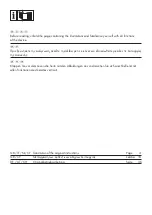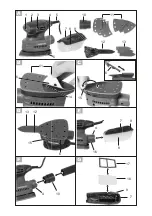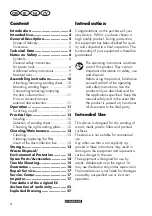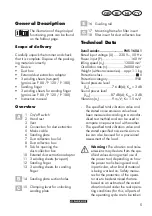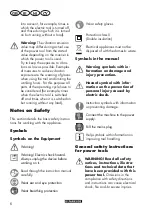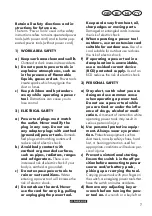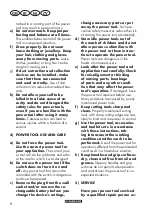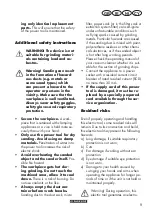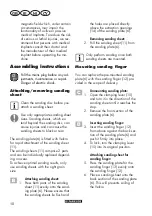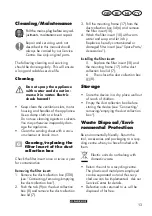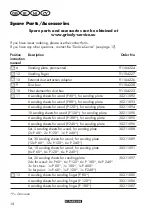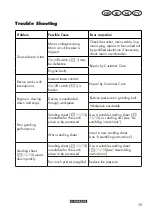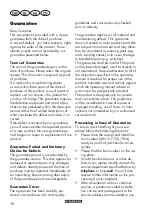
5
GB
CY
NI
IE
General Description
The illustration of the principal
functioning parts can be found
on the foldout page.
Scope of delivery
Carefully unpack the trimmer and check
that it is complete. Dispose of the packag-
ing material correctly.
• Device
• Dust box
• External dust extraction adaptor
• 3 sanding sheets (two-part)
(grain size P 80 / P 120 / P 180)
• Sanding fi nger
• 3 sanding sheets for sanding fi nger
(grain size P 80 / P 120 / P 180)
• Instruction manual
Overview
1 On/off switch
2 Hand rest
3 Vent
4 Connection for dust extraction
5 Mains cable
6 Sanding plate
7 Dust collection box lid
8 Dust collection box
9 Tab for opening the
dust collection box
10 External dust extraction adaptor
11 3 sanding sheets (two-part)
12 Sanding fi nger
13 3 sanding sheets for sanding
fi nger
14 Sanding plate suction holes
15 Clamping lever for unlocking
sanding plate
16 Guiding rail
17 Mounting frame for fi lter insert
18 Filter insert for dust collection box
Technical Data
Detail sander ......................... PMS 160 A1
Rated input voltage (U) ..... 230 V~, 50 Hz
Power input (P) ............................ 160 W
Idling speed (n
0
) ....................13000 min
-1
Oscillation rate (n) .................26000 min
-1
Weight (without accessories) ... appr. 1.1 kg
Protection class ................................. II
Protection category........................... IPX0
Sound pressure level
(L
pA
) ...................... 76
dB(A); K
pA
= 3 dB
Sound power level
(L
WA
) ....................
87 dB(A); K
WA
= 3 dB
Vibration (a
h
) ............ 9 m/s
2
;
K= 1.5 m/s
2
- The specifi ed total vibration value and
the stated noise emission value have
been measured according to a standar-
dised test method and can be used to
compare one power tool with another.
- The specifi ed total vibration value and
the stated specifi ed noise emission va-
lue can also be used for a provisional
assessment of the load.
Warning:
The vibration and noise
emissions may deviate from the spe-
cifi ed values during actual use of
the power tool, depending on how
the power tool is being used and,
in particular, what kind of material
is being worked on. Safety measu-
res for the protection of the opera-
tor are to be determined that are
based on an estimate of the actual
vibration load under the real opera-
ting conditions (for this, all parts of
the operating cycle are to be taken


